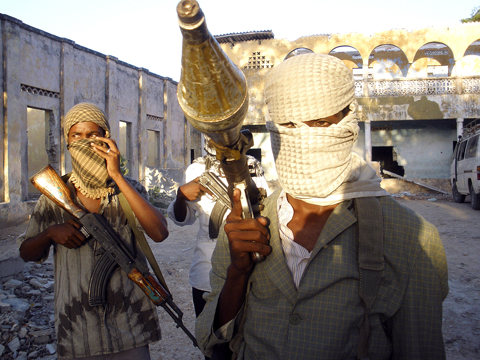The Djibouti peace process is at risk of going “down the drain” and needs urgent support from the Organization of the Islamic Conference (OIC), the OIC chief said on Saturday.
Secretary-General Ekmeleddin Ihsanoglu told a meeting of OIC foreign ministers that they needed to contribute troops, equipment and financial support to the African Union Mission to Somalia to prevent the collapse of the peace process when Ethiopia pulls out its troops from the country in the coming days.
“The Djibouti peace process, which remains the only credible political process currently under way in Somalia, in which the OIC is a major international stakeholder and facilitator, is under severe threat,” Ihsanoglu said.

PHOTO: AP
“Our heavy investment in the process, which produced the historic Djibouti Peace Agreement between the Transitional Federal Government and the coalition of the opposition ... must not be allowed to go down the drain and needs the full support of all the member states,” Ihsanoglu said.
Ihsanoglu also called on OIC members to offer up humanitarian assistance to Somalians and for the organization to open up an office in Mogadishu “as a symbol of our enduring engagement with Somalia.”
Ethiopia pledged on Saturday that it would not leave behind a power vacuum when it completed its troop withdrawal from Somalia in the coming days, two years after it invaded the country.
There are 3,600 Ugandan and Burundian African Union peacekeepers in Somalia, but they are ill-equipped and under-funded and have been unable to restore stability in the country.
Ethiopia invaded Somalia in 2006 to rescue an embattled transitional administration and oust the Islamic Courts Union, which had taken control of most of the country and started imposing a strict form of Shariah.
Ethiopia’s pullout was agreed upon by the Somali government and the more moderate wing of the Islamist-led political opposition during UN-sponsored reconciliation talks in Djibouti.
In Somalia, Islamic insurgents appeared to be scrambling for power, taking over several police stations in the capital as Ethiopian troops began to pull out, witnesses said.
Many fear the Ethiopian pullout — and last month’s resignation of Somalia’s president — will cause Islamic militant groups to fight among themselves for power, bringing even more chaos.
“We have to show commitment to do our part in security, we want to help people feel secure,” Abdirahim Issa Adow, a spokesman for one wing of the insurgency, told reporters on Saturday after deploying troops to three of Mogadishu’s 14 police stations.
His Union of Islamic Courts is not allied to the most powerful insurgent group, al-Shabab, which has taken over most of Somalia.
The US accuses al-Shabab of harboring the al-Qaeda-linked terrorists who blew up the US embassies in Kenya and Tanzania in 1998. Many of the insurgency’s senior figures are Islamic radicals; some are on the US State Department’s list of wanted terrorists.
The Somali government controls only Baidoa, the seat of Parliament, and pockets of Mogadishu. There is no effective military or police force; some police bases are occupied by government forces and others are vacant. The three taken over on Saturday were vacated months ago.

‘TERRORIST ATTACK’: The convoy of Brigadier General Hamdi Shukri resulted in the ‘martyrdom of five of our armed forces,’ the Presidential Leadership Council said A blast targeting the convoy of a Saudi Arabian-backed armed group killed five in Yemen’s southern city of Aden and injured the commander of the government-allied unit, officials said on Wednesday. “The treacherous terrorist attack targeting the convoy of Brigadier General Hamdi Shukri, commander of the Second Giants Brigade, resulted in the martyrdom of five of our armed forces heroes and the injury of three others,” Yemen’s Saudi Arabia-backed Presidential Leadership Council said in a statement published by Yemeni news agency Saba. A security source told reporters that a car bomb on the side of the road in the Ja’awla area in

PRECARIOUS RELATIONS: Commentators in Saudi Arabia accuse the UAE of growing too bold, backing forces at odds with Saudi interests in various conflicts A Saudi Arabian media campaign targeting the United Arab Emirates (UAE) has deepened the Gulf’s worst row in years, stoking fears of a damaging fall-out in the financial heart of the Middle East. Fiery accusations of rights abuses and betrayal have circulated for weeks in state-run and social media after a brief conflict in Yemen, where Saudi airstrikes quelled an offensive by UAE-backed separatists. The United Arab Emirates is “investing in chaos and supporting secessionists” from Libya to Yemen and the Horn of Africa, Saudi Arabia’s al-Ekhbariya TV charged in a report this week. Such invective has been unheard of

US President Donald Trump on Saturday warned Canada that if it concludes a trade deal with China, he would impose a 100 percent tariff on all goods coming over the border. Relations between the US and its northern neighbor have been rocky since Trump returned to the White House a year ago, with spats over trade and Canadian Prime Minister Mark Carney decrying a “rupture” in the US-led global order. During a visit to Beijing earlier this month, Carney hailed a “new strategic partnership” with China that resulted in a “preliminary, but landmark trade agreement” to reduce tariffs — but

SCAM CLAMPDOWN: About 130 South Korean scam suspects have been sent home since October last year, and 60 more are still waiting for repatriation Dozens of South Koreans allegedly involved in online scams in Cambodia were yesterday returned to South Korea to face investigations in what was the largest group repatriation of Korean criminal suspects from abroad. The 73 South Korean suspects allegedly scammed fellow Koreans out of 48.6 billion won (US$33 million), South Korea said. Upon arrival in South Korea’s Incheon International Airport aboard a chartered plane, the suspects — 65 men and eight women — were sent to police stations. Local TV footage showed the suspects, in handcuffs and wearing masks, being escorted by police officers and boarding buses. They were among about 260 South